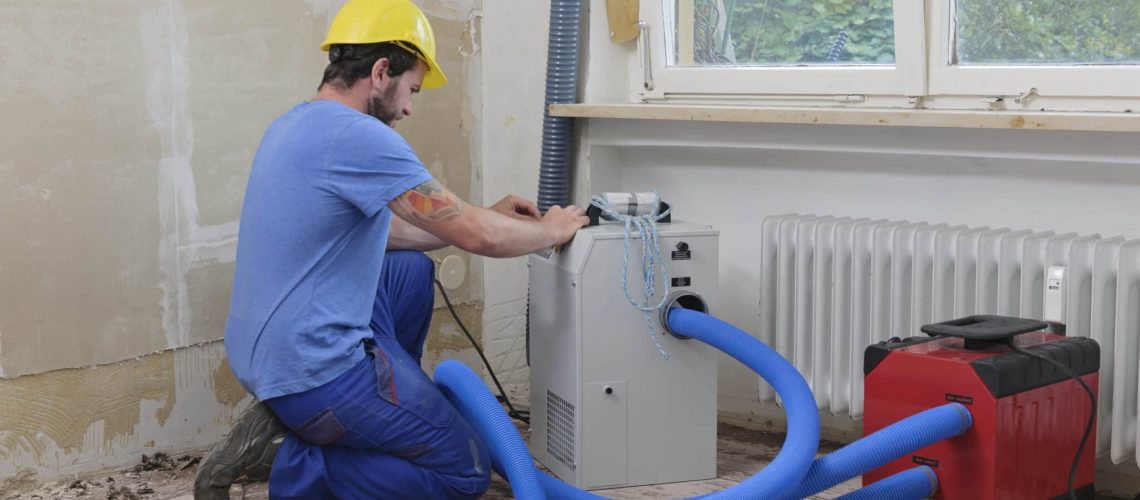Basements often have a reputation for being damp and musty, but with the right approach, you can convert yours into a dry and healthy environment. A crucial element in achieving this transformation is utilizing a dehumidifier. In this article, we’ll delve into the significance of controlling humidity levels in basements and offer practical advice for maximizing the effectiveness of dehumidifiers.
Understanding Basement Humidity Levels:
Due to their underground location and lack of ventilation, basements tend to have higher humidity levels than the rest of the house. Excess humidity can lead to mold growth, musty odors, and damage to furniture and belongings. Monitoring and controlling humidity levels in your basement is essential to prevent these issues.
Using a dehumidifier in your basement offers several key benefits that can significantly improve the environment and overall quality of your home. Here are some of the primary advantages:
- Prevents Mold and Mildew Growth:
Excess humidity in your basement can create the perfect environment for mold and mildew to thrive. These fungi not only damage your home’s structure but can also pose serious health risks. A dehumidifier helps maintain optimal humidity levels, typically between 30% to 50%, which inhibits mold and mildew growth.
- Protects Your Belongings:
High humidity levels can damage items stored in your basement, such as clothing, books, furniture, and electronics. By reducing humidity, a dehumidifier helps protect these items from moisture-related damage, extending their lifespan.
- Improves Air Quality:
Excessive moisture in the air can lead to musty odors and create an uncomfortable living environment. A dehumidifier helps remove excess moisture, which can improve air quality and create a more comfortable atmosphere in your basement.
- Reduces Allergens:
Dust mites, mold spores, and other allergens thrive in humid environments. By maintaining optimal humidity levels, a dehumidifier can help reduce the presence of these allergens, potentially alleviating allergy symptoms for you and your family.
- Prevents Structural Damage:
High humidity levels can damage the structural integrity of your home over time. Excess moisture can cause wood to warp, metal to rust, and paint to peel. By keeping humidity levels in check, a dehumidifier helps protect your home from these issues.
- Energy Efficiency:
A dehumidifier can also improve the energy efficiency of your home. By removing excess moisture from the air, your air conditioning system doesn’t have to work as hard to maintain a comfortable temperature, potentially leading to lower energy bills.
- Enhances Comfort:
High humidity levels can make your basement feel damp and uncomfortable. By using a dehumidifier to maintain optimal humidity levels, you can create a more pleasant and inviting space for relaxation or storage.
Choosing The Right Size Dehumidifier For Your Basement:
When selecting a dehumidifier for your basement, consider the size of the space and the humidity levels. A dehumidifier with a higher pint capacity is suitable for larger basements or areas with high humidity levels. It’s important to choose a dehumidifier that can effectively remove moisture from the air in your basement to prevent mold and mildew growth.
Placement Tips For Maximum Dehumidification:
Place your dehumidifier in a central location in your basement for optimal air circulation. Keep it away from walls and furniture to ensure efficient operation. It’s also important to place the dehumidifier at least 6 inches away from any walls to allow for proper airflow and moisture removal.
Maintenance Tips To Keep Your Dehumidifier Running Efficiently:
Regular maintenance is essential to ensure your dehumidifier works effectively. This includes emptying the water tank regularly, cleaning the air filter, and checking for any damage. It’s also a good idea to clean the coils and fan blades periodically to prevent dust and dirt buildup, which can reduce the dehumidifier’s efficiency.
Using A Hygrometer To Monitor Basement Humidity:
A hygrometer is a useful tool for monitoring humidity levels in your basement. It can help you determine if your dehumidifier is working effectively and if adjustments are needed. Place the hygrometer in a central location in your basement and check it regularly to ensure humidity levels are within the recommended range.
Additional Moisture Prevention Tips For Basements:
To further reduce moisture in your basement, consider using a basement waterproofing system, sealing cracks and gaps, and improving ventilation. These measures can help prevent water intrusion and reduce humidity levels in your basement, creating a drier and healthier environment.
Dehumidifiers And Basement Air Quality:
By reducing humidity levels, dehumidifiers can help improve air quality in your basement, making it a healthier environment for you and your family. Lower humidity levels can also reduce the growth of mold and mildew, which can improve respiratory health and reduce allergy symptoms.
Dehumidifiers As A Solution For Musty Basement Odors:
Musty odors are often caused by mold and mildew growth, which thrive in moist environments. A dehumidifier can help eliminate these odors by reducing humidity levels and preventing mold and mildew growth. Regular use of a dehumidifier can help keep your basement smelling fresh and clean.
Integrating A Dehumidifier Into Your Basement Waterproofing Strategy:
A dehumidifier can complement other basement waterproofing measures, such as sealing cracks and installing a sump pump, to keep your basement dry and healthy. By removing excess moisture from the air, a dehumidifier can help prevent water damage and mold growth, protecting your home and belongings.
In summary, incorporating a dehumidifier into your basement can greatly enhance its habitability while safeguarding both your home and health. By grasping the importance of basement humidity control and implementing the suggestions provided, you can establish a dry and healthy environment that will provide long-term enjoyment for you and your family.


